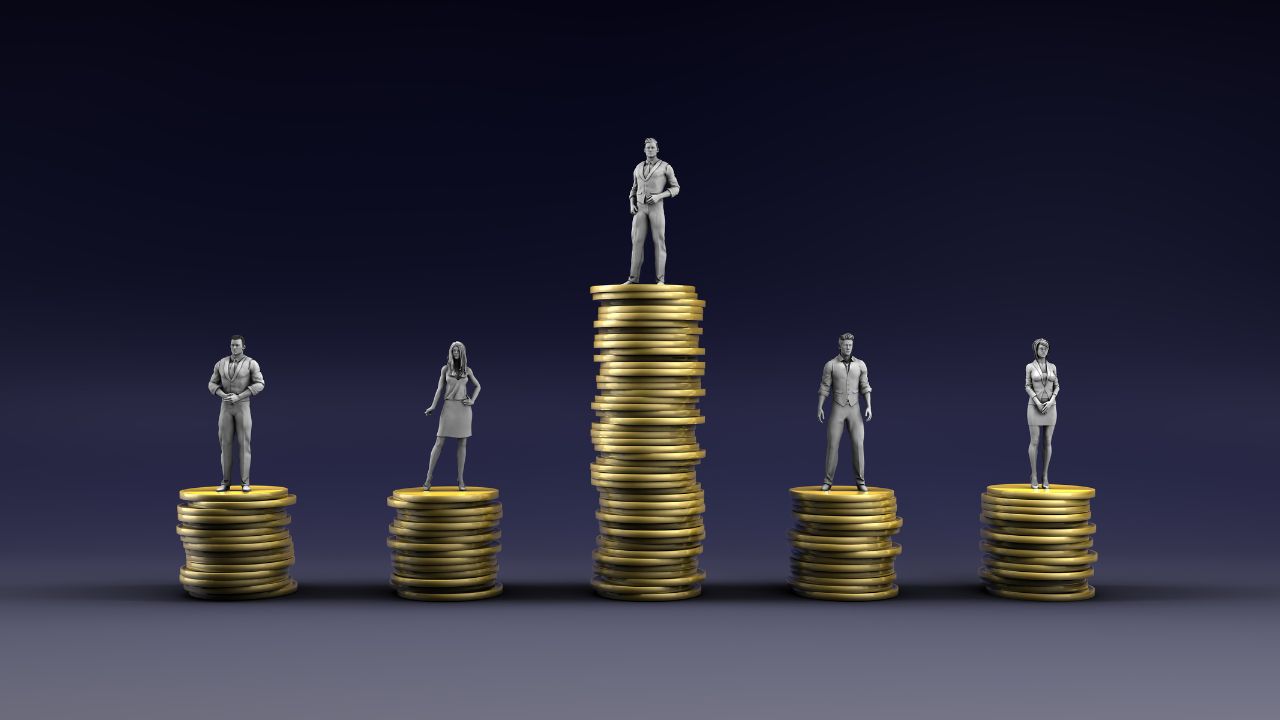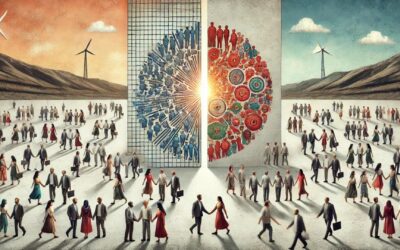- Introduction:
- Causes of Wealth Inequality:
- Effects of Wealth Inequality:
- Debates and Solutions:
- Conclusion:
- Common Questions You May Be Wondering About
- A Deeper Dive — Questions You Might Want to Look into
- How does globalization contribute to wealth inequality?
- Are there any downsides to progressive taxation?
- How does the racial wealth gap contribute to broader issues of racial inequality?
- Can philanthropy and charitable giving help address wealth inequality?
- How does the concentration of wealth affect democracy?
- Keywords:
Introduction:
Wealth inequality and the wealth gap are pressing social issues that affect millions of people worldwide. Wealth inequality refers to the unequal distribution of assets and resources among individuals and groups, while the wealth gap refers to the difference in wealth between the richest and poorest members of society. These issues are not only morally problematic but also have economic and social consequences that affect the wellbeing of entire communities. Therefore, it is essential to understand the causes, effects, and possible solutions to these issues.
Causes of Wealth Inequality:
Historical context and systemic factors: Historical discrimination and oppression against certain groups, such as racial minorities and women, have resulted in a persistent wealth gap. For instance, in the United States, the legacy of slavery, segregation, and redlining has limited the wealth accumulation of African Americans for generations. Similarly, women have historically faced unequal access to education, employment, and credit, which has limited their wealth accumulation.
Institutional biases and policies have also contributed to wealth inequality. For example, tax policies that favor the wealthy, deregulation of industries that benefit the wealthy, and weak labor protections have all resulted in the concentration of wealth among a small portion of the population. In addition, globalization and economic shifts have created winners and losers in the economy, with some individuals and groups benefiting from economic growth and others left behind.
Individual factors: Educational attainment and skills are strongly correlated with wealth accumulation. Individuals with higher levels of education and specialized skills have greater access to higher-paying jobs, leading to more significant opportunities for wealth accumulation. Additionally, occupation and industry also affect wealth accumulation. High-paying jobs in certain industries, such as finance or technology, tend to lead to greater wealth accumulation than low-paying jobs in other industries, such as retail or hospitality.
Inheritance and family wealth also contribute to wealth inequality. Inheritance allows individuals to start their lives with significant wealth, providing them with a head start over those without such resources. Family wealth also allows individuals to access better education and health care, which leads to greater opportunities for wealth accumulation.
Effects of Wealth Inequality:
Economic effects: Wealth inequality has negative economic consequences, including reduced economic growth and mobility, and unequal access to opportunities and resources. Inequality can limit economic growth by reducing consumer demand, as lower-income individuals have less disposable income to spend. Additionally, inequality can reduce economic mobility, making it difficult for individuals to move up the economic ladder, limiting opportunities and increasing social unrest.
Social effects: The negative social effects of wealth inequality are severe. Inequality increases poverty and social instability, leading to increased crime rates, political polarization, and social unrest. Additionally, inequality has negative effects on health and well-being. Individuals living in poverty are more likely to experience health problems and have a shorter life expectancy than individuals with more resources.
Political effects: Wealth inequality has significant political consequences, including unequal representation and power, and social unrest. Wealthy individuals and corporations can exert greater political influence, leading to policies that benefit the wealthy and powerful, often at the expense of the poor and marginalized. Additionally, social unrest can result from frustration and dissatisfaction with the political system and its ability to address the needs of all members of society.
Debates and Solutions:
Conservative arguments against wealth redistribution: Conservative arguments against wealth redistribution often center around free market principles and individual responsibility. Conservatives argue that individuals should be free to accumulate as much wealth as they can, and that the government should not interfere with the market’s natural distribution of wealth. Additionally, conservatives argue that redistribution policies can stifle innovation and entrepreneurship, as high taxes and regulations can disincentivize wealth creation.
Liberal arguments for wealth redistribution: Liberal arguments for wealth redistribution focus on social justice and equality, as well as economic efficiency and stability. Liberals argue that the government has a responsibility to address the wealth gap, as it perpetuates social and economic inequality. Additionally, they argue that redistribution policies can stimulate economic growth, as individuals with more resources can contribute more to the economy.
Proposed solutions: There are several proposed solutions to address wealth inequality and the wealth gap. Progressive taxation is one potential solution, where individuals with higher incomes are taxed at a higher rate than those with lower incomes. This policy is designed to redistribute wealth and reduce income inequality. Social safety nets and public services, such as healthcare and education, can also help reduce wealth inequality by providing more opportunities to individuals with fewer resources.
Education and workforce development are additional solutions that can reduce wealth inequality. Providing access to quality education and training programs can help individuals acquire the skills and knowledge necessary to access higher-paying jobs and increase their wealth accumulation. Lastly, corporate social responsibility and ethical investment can encourage businesses to prioritize social and environmental concerns in their operations and investments, which can lead to more equitable wealth distribution.
Conclusion:
In conclusion, wealth inequality and the wealth gap are pressing social issues that have economic, social, and political consequences. Addressing these issues requires understanding the causes and effects of wealth inequality, as well as supporting policies and initiatives designed to reduce the wealth gap. While there are debates over the best approach, it is clear that action is necessary to ensure a more equitable and just society for all.
Common Questions You May Be Wondering About
What is the difference between income inequality and wealth inequality?
Income inequality refers to the unequal distribution of income among individuals and groups, while wealth inequality refers to the unequal distribution of assets and resources. While income inequality focuses on differences in earnings, wealth inequality takes into account a broader range of assets, such as property, investments, and savings.
How does wealth inequality affect the economy?
Wealth inequality can negatively affect the economy by reducing economic growth and mobility, and by limiting access to opportunities and resources. For example, low levels of consumer demand can result from lower-income individuals having less disposable income to spend, leading to a decrease in economic growth. Additionally, wealth inequality can limit economic mobility, making it difficult for individuals to move up the economic ladder.
Are there any countries with low levels of wealth inequality?
There are a few countries with relatively low levels of wealth inequality, such as Norway, Finland, and Sweden. These countries have implemented policies such as progressive taxation, strong social safety nets, and free education, which have contributed to more equal distribution of wealth.
Can education and training programs help reduce wealth inequality?
Yes, education and training programs can help reduce wealth inequality by providing individuals with the skills and knowledge necessary to access higher-paying jobs and increase their wealth accumulation. Additionally, education can promote social mobility, providing individuals with opportunities to move up the economic ladder.
What can individuals do to address wealth inequality?
Individuals can take various actions to address wealth inequality, such as supporting policies and initiatives that reduce the wealth gap, volunteering with organizations that work to support low-income communities, and supporting businesses that prioritize social and environmental concerns in their operations and investments. Additionally, individuals can educate themselves and others about wealth inequality and its effects, and advocate for change in their communities and political systems.
A Deeper Dive — Questions You Might Want to Look into
How does globalization contribute to wealth inequality?
Globalization can contribute to wealth inequality by creating winners and losers in the global economy. As manufacturing and service jobs move to lower-wage countries, individuals in those countries can benefit from increased job opportunities and higher wages. However, individuals in higher-wage countries may lose their jobs and experience downward pressure on wages, leading to greater income and wealth inequality.
Are there any downsides to progressive taxation?
While progressive taxation is one potential solution to reduce wealth inequality, there are some downsides. High tax rates on the wealthy can disincentivize work and entrepreneurship, as individuals may feel that the rewards for their efforts are not worth the tax burden. Additionally, some argue that progressive taxation can lead to capital flight, as wealthy individuals and corporations may move their assets and operations to lower-tax jurisdictions.
How does the racial wealth gap contribute to broader issues of racial inequality?
The racial wealth gap is a significant contributor to broader issues of racial inequality. The legacy of slavery, segregation, and discrimination has limited the wealth accumulation of African Americans and other racial and ethnic minorities. This wealth gap has far-reaching effects on education, health, housing, and other areas of life, perpetuating inequality and social injustice.
Can philanthropy and charitable giving help address wealth inequality?
While philanthropy and charitable giving can provide important support for low-income communities, they are not a comprehensive solution to wealth inequality. Charitable giving is voluntary and depends on the generosity of individuals and corporations, which may not always be reliable or consistent. Additionally, charitable giving does not address the systemic causes of wealth inequality, such as unequal access to education and employment opportunities.
How does the concentration of wealth affect democracy?
The concentration of wealth can have negative effects on democracy by creating unequal representation and power. Wealthy individuals and corporations can exert greater political influence, leading to policies that benefit the wealthy and powerful, often at the expense of the poor and marginalized. This can lead to a breakdown in democratic institutions and a lack of accountability for those in power.
Keywords
- Wealth inequality: The unequal distribution of assets and resources among individuals and groups.
- Wealth gap: The difference in wealth between the richest and poorest members of society.
- Progressive taxation: A tax system where individuals with higher incomes are taxed at a higher rate than those with lower incomes, with the goal of reducing income inequality.
- Social justice: The concept of promoting fairness and equality in society, particularly for marginalized or disadvantaged groups.
- Economic mobility: The ability of individuals or families to move up or down the economic ladder over time.
- Corporate social responsibility: A business model that prioritizes ethical and socially responsible practices, such as environmental sustainability and fair labor practices.
- Racial wealth gap: The persistent difference in wealth accumulation between different racial and ethnic groups, often resulting from historical discrimination and systemic barriers.
- Philanthropy: The act of donating time, money, or resources to charitable causes or organizations.
- Economic inequality: The unequal distribution of income, wealth, or opportunities among individuals or groups within an economy.
- Social instability: A state of unrest or upheaval within society, often resulting from economic, political, or social factors.
- Political power: The ability to influence or control political decision-making and policy.
- Globalization: The process of increased interconnectedness and interdependence among countries, often in the areas of trade, finance, and culture.
- Social safety nets: Government programs or policies designed to provide financial or other forms of assistance to individuals or families facing hardship, such as unemployment or poverty.
- Education: The process of acquiring knowledge, skills, and values through formal or informal learning.
- Innovation: The creation or introduction of new ideas, products, or methods that improve or transform existing systems or processes.
- Entrepreneurship: The activity of starting or running a business or organization, typically involving risk-taking and innovation.












0 Comments